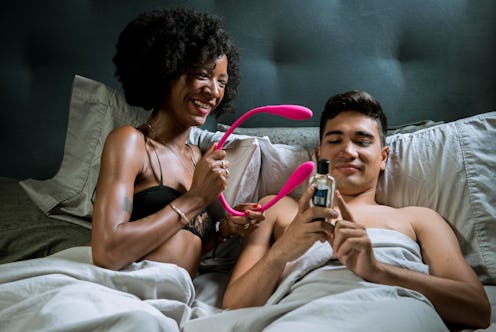
From the repressive, traditional 1950s to the exploratory 1970s, every decade has its own sexual mores. Although individuals may buck the trends, the overarching attitudes about sex we see reflected around us can reveal a lot about how we're getting it on as a country. So where are we at in 2016? It's impossible to answer that question without going online.
It seems not a month goes by today without the publication of a think piece or study analyzing the internet dating apocalypse (or second coming, depending on the author's view of the subject). Is dating app hook up culture killing romance? Are digital forms of connection making courtship more misogynistic? Do dating apps literally give you STDs? The questions (some reasonable, and some absurd) go on.
Given this phenomenon, one company partially responsible for transforming how people meet and mate decided to throw some data at the debate. OkCupid released statistics pulled from roughly one million users about sex, love, and dating, comparing responses from 2005, 2010, and 2015 to see how courtship has changed over the past decade. Most of what they found is hardly shocking, but some of it might raise an eyebrow or two. Here are five ways dating attitudes developed:
1. People Care Less About Their "Sex Number"
In 2005, 70 percent of respondents said there was "such thing as having too many sex partners." As if! In 2015, only 52 percent said the same, in a trend that can only suggest we are finally realizing how little our sex number says about us.
2. People Are Less Open To Sex On A First Date
Those decrying the orgiastic sex-a-thon supposedly brought about by internet dating take note: 69 percent of folks in 2005 said it was cool to have sex on a first date, but only 50 percent felt the same in 2015, so we're actually getting more conservative as the years go by.
3. F*ck Buddies Are More Common
Folks may not be as down to have sex on a first date, but they are more into NSA sex friends. In 2010, 50 percent said they would "consider having a friendship based primarily on sex, with no intentions for love, romance, or long-term commitment." In 2015, that number shot up to 61 percent.
4. There's Less Stigma Against Female Sexuality
Ah the sexual double standard, every woman's dating nightmare. Feminists will rejoice that in 2005, 71 percent of people thought it was OK for a woman to talk openly about her sexual exploits, and that in 2015, a whopping 86 percent said it was acceptable.
5. Love Trumps Sex
Everyone just goes online for the boundless bangin' right? Well, not so much, says OkCupid's data. Turns out the majority of folks are looking for love, not sex, and that hasn't changed a bit over the past ten years. In 2005 and in 2015, 75 percent of people ranked love over sex in their online search for human connection.
Want more of Bustle's Sex and Relationships coverage? Check out our video on sex positions for small penises:
Images: Andrew Zaeh/Bustle; Giphy (5)